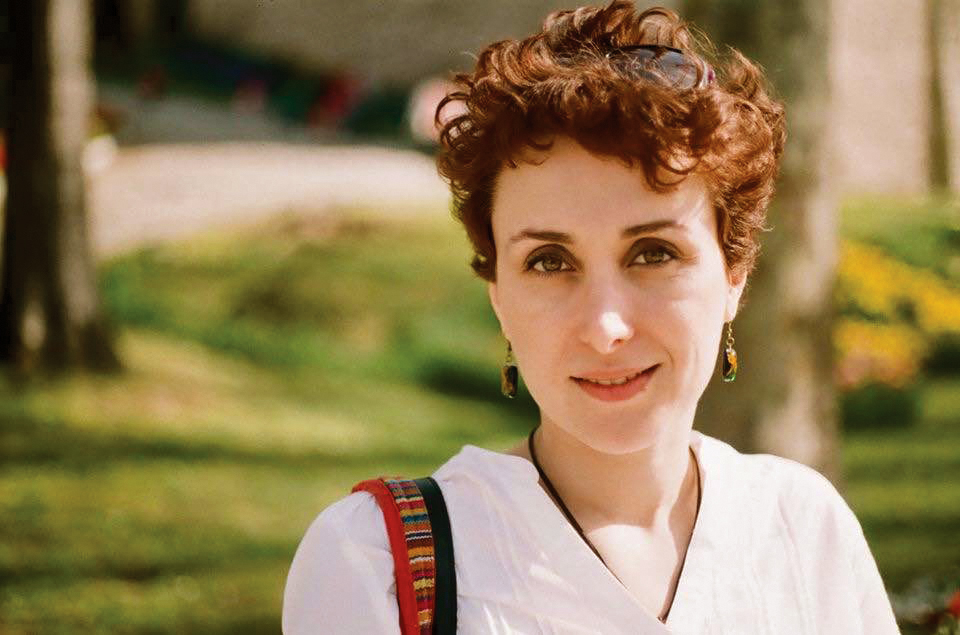
A poet and a gentleman: Dick Davis at the West Chester Poetry Conference last week. (Photo: Gerry Cambridge)
Poet Dick Davis was staying at the home of Persian scholar Asghar Seyed-Gohrab in Leiden a few years ago. As he headed for bed one night, his host suggested he take a look at a sheaf of poems by Fatemeh Shams. The British poet, who is the foremost translator of Persian literature into English, ever (as well as a gifted poet in his own right), followed his advice.
He was up most of the night. He was hooked. And last week at the West Chester Poetry Conference, we had a chance to hear the collaboration that resulted from a late night in the Netherlands. When They Broke Down the Door: Poems was published a few months ago by Mage Publishers, which also published his translation of the eleventh-century Vis & Ramin (500 pages of rhyming couplets).

She’s coming to the U.S. in 2017. (Photo: Mage)
Dick Davis is the translator of another eleventh-century masterpiece, The Shahnameh – well, we wrote about the poet and his translations here – so the poems of this poet, born in 1983, provided an especial challenge: “I usually read medieval Persian poetry, not modern poetry, and the idiom is different, so I had to read them slowly to be sure I was getting everything – even so I’m sure there were things I missed,” he explained to me.
Yet powerful affinities link The Shahnameh with the poems of this 21st century poet. The Persian “Book of Kings” echoes with a “recurrent cry for justice against cruel or incompetent kings,” Dick writes in the introduction. Prison poems begin during the same era in Persia as well – Mas’ud Sa’d (1046-1121) starts the sad tradition, and it continues to this day. Political anger bubbles below the surface in Persian poetry throughout the last millennium.
And so it does with Fatemeh Shams. “It is an association that may at first sight seem counter-intuitive – the privacy of erotic passion allied with the public stance of political protest,” the translator writes, “but the link is of course that both the passion and the politics are subversive of the status quo – of patriarchy that would deny women erotic autonomy, and of political authority that would deny them social freedom.”

Shams was born in Mashhad, the second most important city in the Iran for Shia pilgrimage (it has the tomb of Imam Reza, the eight Shia Imam). Simin Behbahani was a notable influence, and perhaps encouraged the younger poet to write on contemporary subjects in traditional forms, though Shams is equally at ease in free verse.
As an undergraduate at the University of Tehran, her political involvement led to a warrant for her arrest, and she fled to her hometown Mashhad. Later, while studying in England, the government crackdown on the Green Movement meant that she was effectively an exile. Her sister was imprisoned, and the poet’s eight-year relationship cracked under the strain.
“Her poetry comes most strikingly out of a response to human suffering, that of others and her own, and one of the reasons that politics is so omnipresent in many of her poems is that it is seen as the chief cause of such suffering,” yet “during the dark days of her exile it has been poetry that has saved her, and clearly for her, poetry – despite the political implications of her own verse – is something inward and personal rather than public and propagandistic…”
She is joining the faculty at the University of Pennsylvania in January, as assistant professor of Persian.
Three poems reprinted below. (I was going to make it two, but I couldn’t decide among them). The first is the poem about the city of her birth, Mashhad; it’s the poem that opens the collection. The next two … a different kind of suffering.
Mashhad
I come from a town of beheaded closed cafés
from a town of latticed houses
from a town whose old execution square is now called Martyr’s Square
from the meeting place of cigarette smoke and angels’ wings
they’ve named the barracks The Resting Place
which makes no reference to the Restlessness of the Sentries
polluted by two strands of a woman’s hair
two strands!
I come from the town of stubborn singers
from the place of my own martyrdom
Mashhad.
Even If You’re Never to Be Here
I want you in my moments of uncertainty,
Asleep, awake, and in this night of watching endlessly
I want you on cold silent days, I want you in
This wave of pointlessness, this vain futility
I want you season after season in my life
On snowy days, hot days, and spring’s vitality
I want you, I want you every moment of each day
Oh blood that flows within my every artery
I want you even if you’re never to be here
And even if you never give a thought to me
I want you from afar, from near, from everywhere
With all you have and are, wherever you may be.
Overcoat
I curse your gray overcoat
that all at once pours
the smell of your body
and of wanting you,
and the rare expensive scent produced
by that damned company that’s bankrupt now
into my heart
I curse your gray overcoat
not you.
.
Postscript: A quick note from poet David Mason: “Dick is a genius. His project is one of the most humane literary projects of our time.” By “project,” he qualified, he means Dick Davis’s whole body of translations – and his own poems, too. We couldn’t agree more.
Tags: Asghar Seyed-Gohrab, Dick Davis, Fatemeh Shams, Mas'ud Sa'd, Simin Behbahani


June 16th, 2016 at 7:00 pm
I plan on getting Sham’s book. She seems like someone who should be at West Chester next year.
June 16th, 2016 at 7:05 pm
Absolutely agree, Sam!